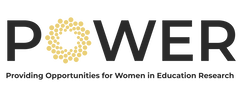|
Announcing a virtual event, organized by the POWER Professional Development Committee.
Come join POWER on November 19th at 11am Eastern / 10 Central for an online discussion about how to move school-based research forward with respectful, responsible inquiry during the COVID-19 pandemic. The one-hour discussion will be based on an article written by Drs. Kathleen Lane, Sonia Cabell, and Sally Drew (https://edarxiv.org/n3hrf/) titled "Retooling to Advance Scientifically Rigorous and Relevant School-based Educational Research During the COVID-19 Pandemic." Kathleen Lane, lead author of the retooling paper, will provide an introduction. Then you will have two opportunities to go into one of three breakout rooms to discuss current concerns, suggestions, and resources related to one of the following three broad topics: Room 1: How do I use this time to re-think my programmatic lines of inquiry with attention to new questions and issues that have arisen due to COVID-19? (led by Dr. Drew) Room 2: How do I disseminate my work when my study fell apart? (led by Dr. Cabell) Room 3: In the time of COVID-19, how do I conceptualize future studies? (led by Dr. Lane) Power steering committee members will be taking notes in each of the breakout sessions, and an overview of the discussions will be posted on the POWER website in December. We hope to see you there! Follow this link to sign yourself up!
0 Comments
By Kelly Farquharson, Nadine Gaab, and Lori SkibbeFive simple steps to starting a POWER HUB
POWER is excited to have the opportunity to offer HUBs. What are POWER HUBs you ask? These are topic-specific networks of researchers who plan to further the mission of POWER through regular meetings and support of their members. Any member of POWER can start a HUB. We have several HUBS established already, but have also received some questions asking for more detailed guidance about starting a HUB. Below, we present five simple steps to starting a POWER HUB.
Ready to start a HUB? Fill out the form at the end of this page and then search our database to find HUB members! Have fun! |
Categories
All
Archives
November 2023
|

